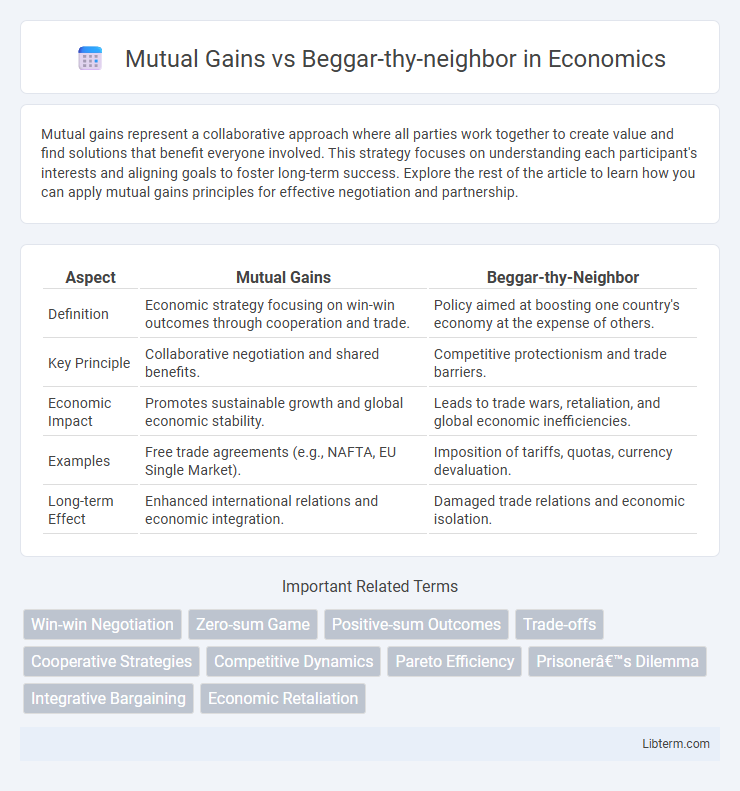Mutual gains represent a collaborative approach where all parties work together to create value and find solutions that benefit everyone involved. This strategy focuses on understanding each participant's interests and aligning goals to foster long-term success. Explore the rest of the article to learn how you can apply mutual gains principles for effective negotiation and partnership.
Table of Comparison
| Aspect | Mutual Gains | Beggar-thy-Neighbor |
|---|---|---|
| Definition | Economic strategy focusing on win-win outcomes through cooperation and trade. | Policy aimed at boosting one country's economy at the expense of others. |
| Key Principle | Collaborative negotiation and shared benefits. | Competitive protectionism and trade barriers. |
| Economic Impact | Promotes sustainable growth and global economic stability. | Leads to trade wars, retaliation, and global economic inefficiencies. |
| Examples | Free trade agreements (e.g., NAFTA, EU Single Market). | Imposition of tariffs, quotas, currency devaluation. |
| Long-term Effect | Enhanced international relations and economic integration. | Damaged trade relations and economic isolation. |
Understanding Mutual Gains: Definition and Principles
Mutual gains refer to negotiation strategies where all parties collaborate to achieve outcomes benefiting everyone involved, emphasizing value creation over competition. Principles of mutual gains include identifying shared interests, expanding the pie through creative problem solving, and fostering trust and open communication. This approach contrasts with beggar-thy-neighbor tactics, which prioritize competitive advantage at the expense of others, often leading to zero-sum outcomes and long-term conflict.
The Concept of Beggar-thy-neighbor Policies
Beggar-thy-neighbor policies are economic strategies where a country seeks to improve its own economic conditions at the expense of other nations, often through tariffs, currency devaluation, or trade barriers that reduce foreign competitors' market access. These policies can lead to retaliatory measures and trade wars, ultimately harming global economic cooperation and growth. Contrastingly, mutual gains approaches emphasize cooperative strategies that promote shared economic benefits and sustained international partnerships.
Historical Overview of Economic Strategies
Mutual gains strategies, rooted in cooperative economic theories from Adam Smith to modern trade agreements, emphasize win-win outcomes that foster long-term growth and international collaboration. Historically, beggar-thy-neighbor policies emerged during the Great Depression as countries sought to protect domestic industries through tariffs and trade barriers, often resulting in retaliatory measures and global economic contraction. The contrast between these approaches highlights a shift from zero-sum competition to integrative strategies enhancing global welfare and sustainable development.
Key Differences Between Mutual Gains and Beggar-thy-neighbor
Mutual gains focus on creating value through cooperative strategies where all parties benefit, emphasizing integrative solutions and long-term relationships. Beggar-thy-neighbor strategies prioritize maximizing individual benefits at others' expense, often leading to zero-sum outcomes and increased conflict. The key difference lies in mutual gains fostering collaboration and shared success, while beggar-thy-neighbor promotes competitive tactics generating mutual loss.
Real-World Examples: Mutual Gains in Practice
Mutual gains strategies manifest in international trade agreements like the United States-Mexico-Canada Agreement (USMCA), where cooperative negotiation fosters shared economic benefits rather than zero-sum competition. Environmental collaborations such as the Paris Agreement illustrate mutual gains by enabling countries to reduce emissions collectively while promoting sustainable development. In business, joint ventures between technology firms emphasize mutual gains through resource sharing and innovation, yielding profits and market expansion for all partners.
Beggar-thy-neighbor Policies: Famous Cases
Beggar-thy-neighbor policies, aimed at improving a country's economy at the expense of others, are exemplified by the Smoot-Hawley Tariff Act of 1930, which triggered retaliatory tariffs and intensified the Great Depression globally. Japan's export restrictions on rare earth elements in 2010 sparked international trade disputes, highlighting the negative consequences of protectionist strategies. These cases demonstrate how such policies can provoke trade wars, damage global economic cooperation, and reduce overall welfare.
Economic Impacts: Short-term vs Long-term Outcomes
Mutual gains strategies foster sustainable economic growth by promoting cooperation and resource optimization, resulting in long-term benefits such as increased productivity, innovation, and stable trade relationships. Beggar-thy-neighbor policies generate short-term advantages by imposing tariffs or trade barriers that protect domestic industries, but they often trigger retaliation, reduce global demand, and harm economic efficiency. Over time, mutual gains approaches enhance overall welfare and economic resilience, whereas beggar-thy-neighbor tactics lead to market distortions, diminished output, and reduced international competitiveness.
The Role of Cooperation in Global Trade
Cooperation in global trade fosters mutual gains by encouraging equitable resource sharing, innovation, and economic growth among nations, contrasting the beggar-thy-neighbor approach that prioritizes unilateral advantage at others' expense. Collaborative trade policies enhance comparative advantages, increase market efficiencies, and reduce retaliatory measures, promoting sustainable development. Emphasizing mutual benefits over competitive isolation strengthens international partnerships and drives collective prosperity in the global economy.
Policy Implications for Governments and Stakeholders
Mutual gains strategies in policymaking emphasize cooperation and shared benefits, leading to sustainable economic growth and improved international relations, while beggar-thy-neighbor policies often cause retaliatory actions and trade conflicts that undermine global stability. Governments adopting mutual gains frameworks create incentives for stakeholder collaboration, fostering innovation and equitable resource distribution, which are critical for long-term development. By contrast, beggar-thy-neighbor approaches can generate short-term domestic advantages but typically result in loss of trust and diminished opportunities for multilateral partnerships.
Building Pathways Toward Sustainable Economic Growth
Mutual gains strategies foster collaboration and shared value creation, driving sustainable economic growth by linking stakeholders' interests with long-term development goals. In contrast, beggar-thy-neighbor policies prioritize short-term national advantage through protectionism and resource exploitation, often leading to trade conflicts and economic inefficiencies. Building pathways toward sustainable growth requires embracing mutual gains frameworks that encourage inclusive cooperation, innovation, and equitable resource management across global markets.
Mutual Gains Infographic

 libterm.com
libterm.com